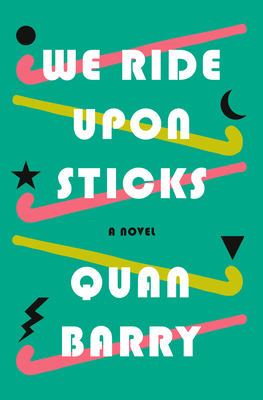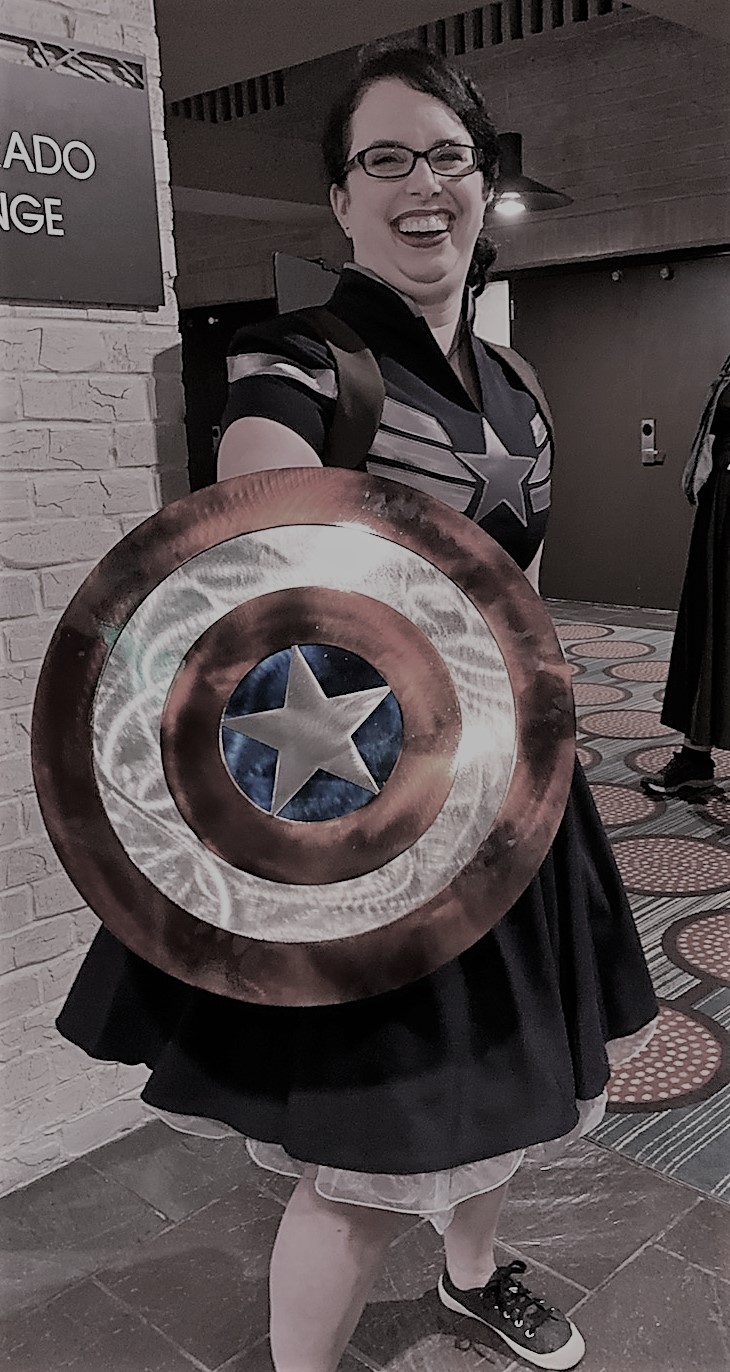Each year, Sirens chair Amy Tenbrink posts monthly reviews of new-to-her fantasy books by women and nonbinary authors. You can find all of her Sirens Book Club reviews at the Sirens Goodreads Group. We invite you to read along and discuss!

In the fall of 1989, I was not a senior in high school, but in my last year of junior high. I didn’t live in coastal Massachusetts, but in western Michigan. I didn’t play field hockey, but rather softball and volleyball—and a year later I starting running cross-country and track.
These differences between me and the girls of We Ride Upon Sticks are, however, mere details in the grander scheme of things. Because Quan Barry seemingly wrote this book for me.
As We Ride Upon Sticks opens, it is, indeed, just about the fall of 1989. The girls—and one boy—of the Danvers Falcons women’s varsity field hockey team are utterly terrible. So terrible that, at sports camp, they make a pact with the devil: a devil that, in Barry’s endlessly hilarious work, is embodied by a notebook with Emilio Estevez on the cover. Tired of losing games, and with all the vagueness of people who haven’t yet learned the necessity of precision, the players ambiguously commit themselves to the devil in exchange for a winning field hockey season.
The Salem witch trials loom large in We Ride Upon Sticks, and not only in the title’s witchy, pithy reference.
In 1692, Danvers was known as Salem Village, just down the road from the more affluent Salem Town (now known as just Salem, home of the famed witch museum and annual Halloween celebration). The original accusers were residents of Salem Village, and the what and who and why of the witch trials is steeped into the Danvers Falcons women’s varsity field hockey team from birth. It’s no coincidence that, when the girls look to the supernatural for help on the field, they turn, as their forebears allegedly did, to the devil. But the critical themes of the Salem witch trials—discussions of power and expectations and conformance—are threaded through We Ride Upon Sticks as well.
Barry’s work is structured around the 1989 field hockey season, from summer camp to the state championships, with a brief epilogue decades later. The story arc is nominally that field hockey season—and how, to maintain their success, the girls must perform increasingly bad acts to sate Emilio. Things start small—a lie, a cheat, a prank—and escalate over the course of the book as the girls attempt to reap the continued success of their bargain.
But this book is about so much more than a notebook with Emilio Estevez on the cover. The narration—cleverly crafted as first-person plural, simultaneously committing to the team collective and bringing the reader along for the ride—jumps from one game to the next, and from one player to the next, without losing the forward momentum of the story. We start with Mel, who is the first to strike a bargain with Emilio, and her suddenly magnificent goalkeeping at summer camp. As the team improves, we meet co-captains Abby Putnam (descendant of a Salem accuser) and Jen Fiorenza (whose bleached and hairsprayed bangs, called the “Claw” by both the book and the team, has a mind of its own). We learn about Girl Cory, who has a stalker, and Boy Cory, who is queer, and Becca, who has very large breasts and all the issues that come with them, and adopted Julie, who now wants to be called Julie Minh to represent her heritage. We spend time with all of these players and more, with their insecurities and unhappinesses, their goals and skills, their families and frustrations.
And that’s the thing about We Ride Upon Sticks: The girls perform bad acts to placate the devil, and while the book is initially sympathetic to the framing of those acts as bad, that frame gradually shifts—even as the magnitude of the acts escalates—until things that were initially “bad,” things girls “shouldn’t” do, instead become acts of self-affirmation.
The relentless feminism of We Ride Upon Sticks is the inexorable recasting of societal transgressions as undeniable reclamations.
Emilio, it seems, doesn’t want you to be bad; he wants you to be you.
Assuming, of course, that Emilio is the devil in the first place. We Ride Upon Sticks never quite answers if the Danvers Falcons women’s varsity field hockey team has actually made a deal with the devil or if, instead, their collective belief supports the notion that they need to be “bad”—and that their societally-imposed construction of “bad” ultimately leads them to a place of self-discovery. But in the end, do we really need to know? The thrust of We Ride Upon Sticks isn’t any of these girls’ relationship with the purported devil, not in any significant way. The thrust is their personal journeys toward independence and freedom.
In 1989, I was in eighth grade. I lived a small town. I was an athlete on a series of mostly terrible teams. We Ride Upon Sticks was true for me, with all the force of nostalgia. Despite that the age is slightly different, the towns are half a country away, and these girls played one of the only sports I never did, these girls’ experiences are my experiences. Barry reconstructs my early 1990s youth, with its two-a-day workouts and Kool-Aid hair dye and lacey prom dresses, with its endless rules and “good girl” notions and inequalities, through a 2020 feminist lens. And she does so incisively, seemingly effortlessly, with a number of epiphanies along the way.
But that doesn’t mean that We Ride Upon Sticks works only for sports girls from small towns who are currently fortyish. We Ride Upon Sticks is two things: First, terrific fun. It’s laugh-out-loud funny, and not only for those who get the in-jokes and the cultural references. Barry’s insight is acute and she uses that to tremendous, hilarious effect. Second, it’s uncompromising in its feminism, in finding a feminist story through a thirty-years-later lens. Barry’s insight serves her—and the reader—here as well, as you relive an earlier time through the contemporary analytic eye of someone who really, really gets it.
This is the best book I’ve read so far in 2020. And I’ve already read over 100.
 By day, Amy Tenbrink dons her supergirl suit and practices transactional and intellectual property law as an executive vice president for a media company. By night, she dons her supergirl cape and plans Sirens and reads over a hundred books a year. She likes nothing quite so much as monster girls, Weasleys, and a well-planned revolution.
By day, Amy Tenbrink dons her supergirl suit and practices transactional and intellectual property law as an executive vice president for a media company. By night, she dons her supergirl cape and plans Sirens and reads over a hundred books a year. She likes nothing quite so much as monster girls, Weasleys, and a well-planned revolution.







Connect with the Sirens community
Sign up for the Sirens newsletter